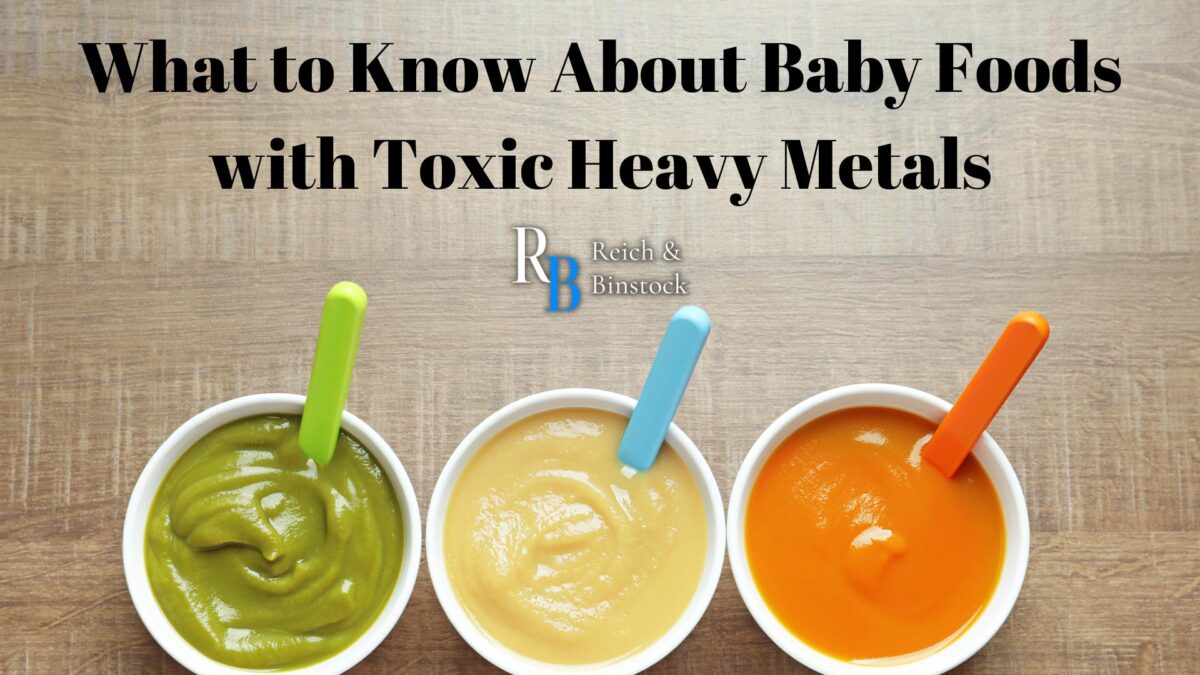Parents’ primary concern is the health and safety of their children. This instinct to protect begins from the very moment they’re born and guides the decisions parents make for them, including what they eat.
Within the last several years, alarming reports have surfaced about the presence of toxic heavy metals in baby foods. This discovery has sent waves of concern across households and the food industry.
As of 2021, the U.S. Food and Drug Administration (FDA) created the Closer to Zero campaign to decrease heavy metals in baby food. The only problem is that the campaign may take longer than the proposed 2024 date, which is too long for concerned parents. So what can parents do?
In this latest blog post, the Houston product liability attorneys from Reich & Binstock will highlight popular baby foods containing toxic metals, the health risks for babies who consume these foods, and the legal options available to parents. To schedule a consultation with one of our compassionate attorneys, call 713-622-7271 today.
How Do Toxic Heavy Metals Get Into Baby Food?
The presence of toxic heavy metals in store-bought baby food is a concerning issue that warrants a closer look at how these contaminants find their way into products. These heavy metals, which include arsenic, lead, cadmium, and mercury, can enter the baby food supply chain through various routes.
One primary source of metals in baby food is the environment, as these metals naturally occur in soil and water. Crops absorb contaminants from contaminated soil or heavy metal-contaminated water when cultivated, and these contaminants subsequently make their way into baby food products.
Since heavy metals can find their way into fruits and vegetables through water and soil, families who make their own baby food can be at risk of exposure. This also puts organic food at risk since it’s almost impossible to eliminate toxic metals in soil and water completely. While some heavy metals will be present in organic baby food, the levels will be much lower.
Another way that heavy metals can find their way into baby foods is through the processing methods and equipment used in manufacturing baby food, which can introduce heavy metals into the final products.
2023 List of Baby Foods Toxic Heavy Metals Contamination
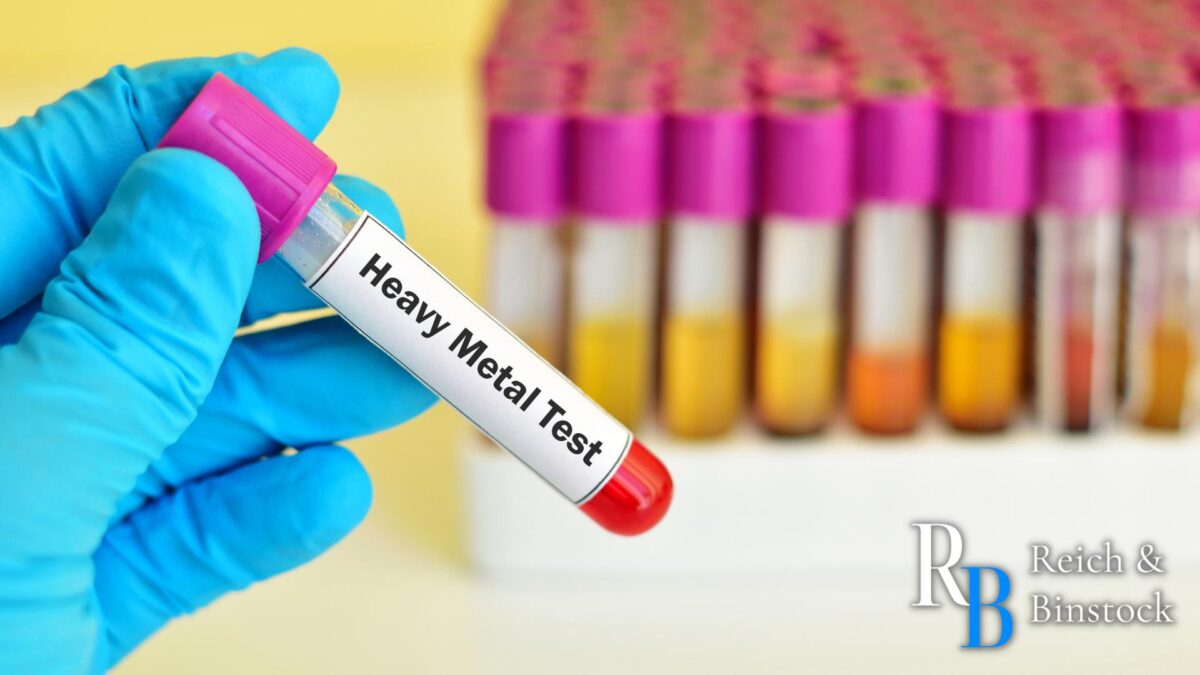
Based on a report released in August of 2022, Healthy Babies Bright Futures (HBBF) tested 288 foods and studied over 7,000 additional baby food test data from previously published studies. They found that 94% of the food tested contained detectable amounts of heavy metals, including store-bought baby food and homemade baby food.
Below are the most common heavy metals found in baby foods and which foods they appear in.
Arsenic in Baby Food
Arsenic often exists in soil and water, potentially entering our water and food, including baby food products. This metal in baby food is problematic because even low levels of this toxic substance can have adverse health effects on infants and young children.
Research has shown that rice-based baby foods, including rice cereals, rice cakes, and other rice snacks, tend to have higher arsenic levels than other baby food products. This is because rice plants have a unique ability to absorb arsenic from the soil, and rice is a common ingredient in many baby food items.
Lead in Baby Food
Lead, a toxic heavy metal, has been found in various baby food products, posing serious health risks to infants and young children. This contamination can occur at different stages of the food production process, including during the cultivation of ingredients, processing, and packaging. Even minimal lead exposure during early childhood can lead to long-term developmental and cognitive impairment.
Recent studies have shed light on the presence of lead in baby food, particularly in baby foods containing fruits, vegetables, and certain grains. The reasons behind this contamination range from environmental factors such as contaminated soil and water to manufacturing practices that unintentionally introduce lead into the baby food aisle.
Cadmium in Baby Food
Cadmium is another natural heavy metal found in soil, water, and plants. When crops used in baby food are cultivated in cadmium-contaminated soil or irrigated with contaminated water sources, they can absorb this toxic metal, leading to its presence in the final products.
Cadmium is a known carcinogen and can also impact the development of vital organs and systems in growing bodies. Over time, cadmium accumulation in the body can lead to chronic health issues.
Mercury in Baby Food
Mercury is another heavy metal that researchers have found in baby food. The baby foods with the highest mercury levels are rice cakes, jasmine rice, and brown rice. The U.S. Environmental Protection Agency (EPA) allows a maximum of 2 parts per billion (ppb) of mercury in drinking water. However, the levels of mercury found in baby foods are almost double that amount.
Other foods that contain mercury are fish and other seafood. While fish are an excellent source of protein, many have high levels of mercury that can be dangerous to children. Some healthy fish choices include salmon, light tuna, cod, and whitefish.
Babies who consume mercury regularly are at risk of developing brain and other developmental and behavioral disorders later in life.
Which Baby Foods Are Most Contaminated with Heavy Metals?
Identifying which baby foods are most contaminated with heavy metals is a critical concern for parents who want to make informed choices for their children’s nutrition. Several studies have shed light on the types of baby foods with higher levels of heavy metal contamination.
While contamination levels can vary between baby food companies and batches, the baby foods with the highest heavy metals are infant rice cereal and other rice products.
Infant Rice Cereal and Other Rice Products
Since rice absorbs arsenic and other metals from the soil, it’s no surprise that rice cereal and other rice-based products contain the highest levels of heavy metals in baby foods. The baby foods are listed below from the most to the least contaminated.
- Rice cakes
- Crisped rice cereal
- Rice puffs
- Brown rice
- Rice-based teething biscuits
- White rice
- Raisins
- Teething crackers (without rice)
- Granola bars with raisins
- Oat-ring cereal
Parents looking for better rice options should choose basmati and sushi rice as they have much lower arsenic levels than other rice types. Always rinse rice thoroughly before cooking, use plenty of water, and drain the excess water afterward. This can also minimize the amount of arsenic exposure for you and your baby.
Which Baby Foods Are Least Contaminated with Heavy Metals?
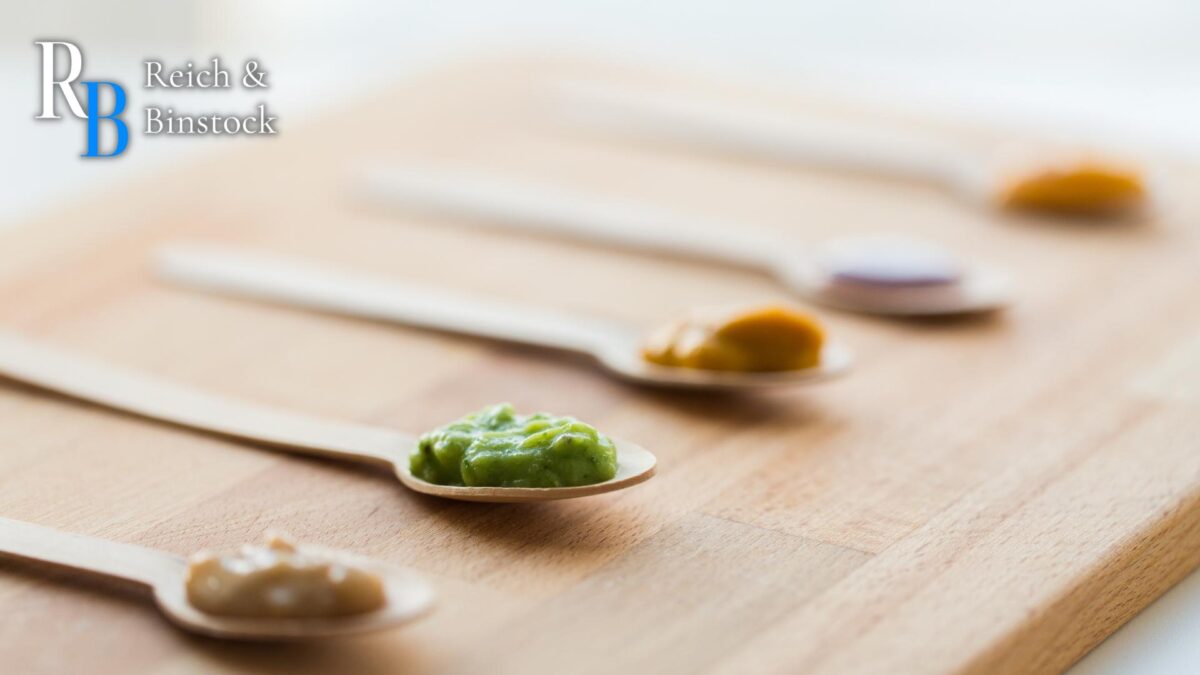
Not all baby foods contain heavy metals. Below are some of the least contaminated baby foods.
- Bananas
- Grits
- Branded meats
- Butternut Squash
- Lamb
- Apples
- Pork
- Eggs
- Oranges
- Watermelon
Sweet Potatoes, Fruits, Meats, and Vegetables
The Healthy Babies Bright Futures (HBBF) recommends that parents should rotate or limit certain foods to limit toxic metal exposure.
- Consume canned fruit sparingly. Instead, opt for fresh and frozen fruit.
- Cantaloupe can be consumed but should not be eaten daily.
- Sweet potato, potato, baby spinach, and carrot should all be rotated and served in variety, meaning babies should not eat the same one every day.
- Peanut butter can still be consumed, but not daily.
- Oatmeal, barley, farro, and millet should be rotated and served in variety.
- Fruit juices, other than grape, are considered safe as long as they are 100% fruit juice, rotated, and not consumed daily. Parents should opt for water or fresh fruit for better options.
What Health Risks Are Associated with Exposure to Heavy Metals?
Exposure to heavy metals through contaminated baby foods can pose serious health risks to infants and young children. At this age, children are particularly vulnerable to the adverse effects of heavy metals due to their developing bodies and sensitive systems. The most common health risks associated with exposure to heavy metals in baby food are neurological, developmental, and behavioral issues.
Can Heavy Metals in Baby Food Harm My Child?
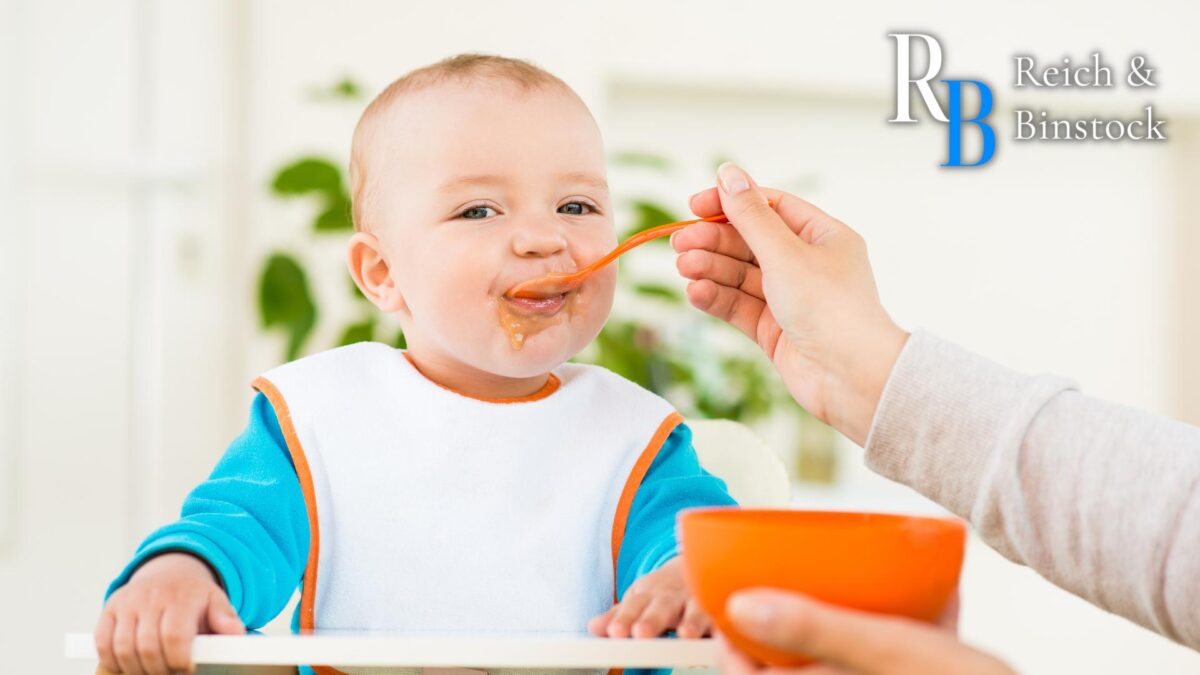
Yes, heavy metals in baby food can potentially harm your child, especially if exposed to these contaminants over an extended period. Here are some ways heavy metals in baby food can harm your child:
- Neurological Development: Heavy metals like lead, mercury, and arsenic can affect your child’s nervous system development. This can lead to developmental delays, cognitive impairments, and behavioral issues.
- Reduced IQ: Even low levels of lead exposure can result in a lowered IQ, potentially affecting your child’s learning abilities and academic success.
- Behavioral Problems: Exposure to heavy metals in baby food has been linked to increased irritability, fussiness, and attention difficulties in children.
- Long-Term Health Implications: The effects of heavy metal exposure in childhood can extend into adulthood, with the risk of developing chronic diseases.
- Gastrointestinal Distress: Some heavy metals, like cadmium, can cause digestive problems like stomach aches and diarrhea.
- Kidney Damage: Heavy metals can harm the kidneys and impair their function, leading to long-term health issues.
- Impaired Immune Function: Heavy metal exposure can weaken your child’s immune system, making them more susceptible to infections and illnesses.
Parents and caregivers must stay informed about the heavy metal content in baby foods to protect the health of infants and young children. Choosing baby foods with lower heavy metal levels, staying updated on product recalls, and advocating for stricter safety standards in baby food production are essential steps in minimizing these health risks.
How Can I Avoid Contaminated Baby Food?
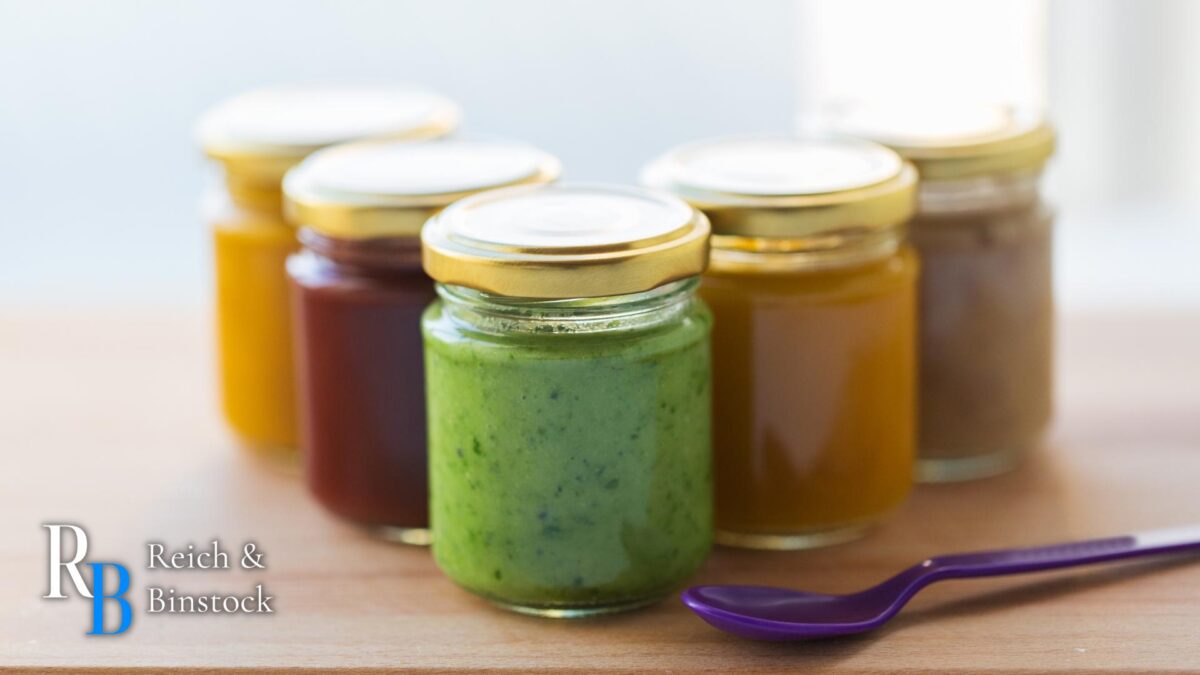
Avoiding contaminated baby food is crucial for ensuring the health and safety of your child. Here are some steps you can take to minimize the risk of a baby’s exposure to heavy metals and contaminants in baby food:
- Research and Choose Trusted Brands. Investigate and choose baby food brands known for their rigorous safety standards and transparent testing practices. Reading reviews and checking for recommendations from trusted sources can help you make informed choices.
- Check for Recalls. Stay updated on product recalls and safety alerts related to baby food. Government agencies often publish recall notices you can access online or through their official websites.
- Opt for Organic. Organic baby food products are often subject to stricter regulations and testing for contaminants. While it’s not a guarantee of safety, choosing organic options can reduce the risk of pesticide exposure and contaminants.
- Diversify Your Baby’s Diet. Avoid relying too heavily on a single type of baby food, especially rice-based products. Diversifying your baby’s diet with various fruits, vegetables, and grains can help reduce exposure to specific contaminants.
- Limit Fish Consumption. Be cautious when introducing fish into your baby’s diet, as some fish can contain elevated levels of mercury. Select fish low in mercury, such as salmon and trout, and avoid high-mercury species like shark and swordfish.
- Avoid Juice Concentrates. Limit fruit juices, especially concentrated varieties, as they can contain higher levels of heavy metals. Fresh and frozen fruits are a healthier option.
- Regularly Check for Updates. Stay informed about the latest research and recommendations regarding heavy metals in baby food. Regulatory agencies may update guidelines and standards over time.
- Consult with Pediatrician. Discuss your baby’s diet and concerns about baby food safety with your pediatrician. They can offer medical advice tailored to your child’s specific needs.
By following these steps, you can make more informed choices when it comes to selecting baby foods and reduce the risk of exposing your child to contaminated products.
What Can I Do If My Child Suffered Harm from Contaminated Baby Food?
If you believe your infant or toddler has been exposed to heavy metals in baby food, there are some steps you can take to ensure the safety and health of your child. Consult with your pediatrician if you notice irregularities in your child’s behavior or other health issues that may have resulted from heavy metals in baby food.
Keep detailed records of your child’s health issues, including symptoms, diagnoses, medical treatments, and any prescribed medications. This documentation will be essential for any potential legal claims or actions.
After seeking medical treatment, parents should consider discussing their legal options with the product liability attorneys from Reich & Binstock. Our attorneys can provide guidance on your legal options and help you determine if you have a valid compensation claim.
As of 2022, the following baby food manufacturers have been named in a class action lawsuit.
- Beech-Nut
- Gerber
- Plum, Inc.
- Nurture, Inc.
- Sprout Foods
- Walmart
The lawsuit states the manufacturers marked the baby food as safe when it actually contained high levels of heavy metals. The Houston product liability attorneys at Reich & Binstock will determine your eligibility for joining the class action lawsuit.
Contact a Houston Product Liability Attorney with Reich & Binstock Today
When your child’s health and well-being are at stake due to contaminated baby food, you deserve the support and guidance of dedicated professionals who can advocate for your family’s rights. At Reich & Binstock, our product liability attorneys will stand by your side. We will provide sound legal counsel, and pursue justice on your behalf.
We understand the gravity of the situation and are here to help you navigate the complex legal process, holding those responsible accountable for the harm caused. Your child’s safety is key, and our team is ready to fight for the compensation and closure your family deserves.
To schedule a free consultation with one of our Houston product liability attorneys, call Reich & Binstock at 713-622-7271.

